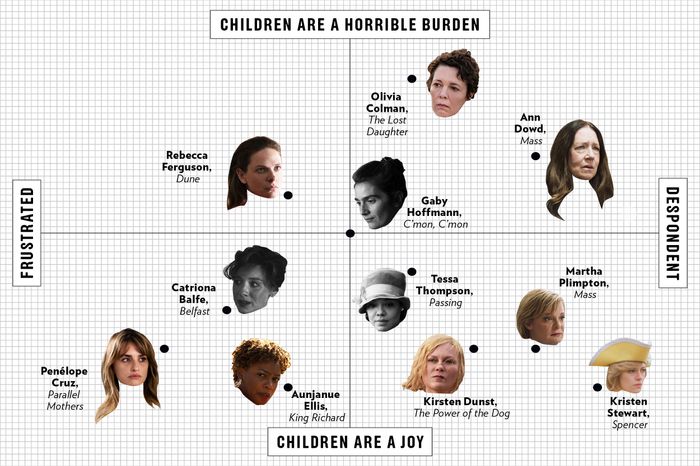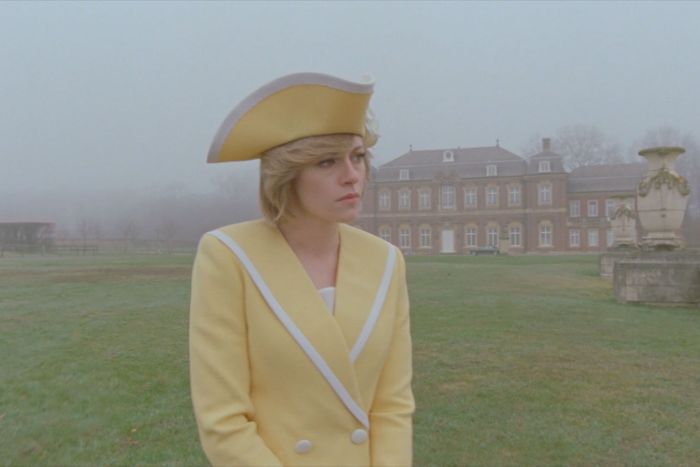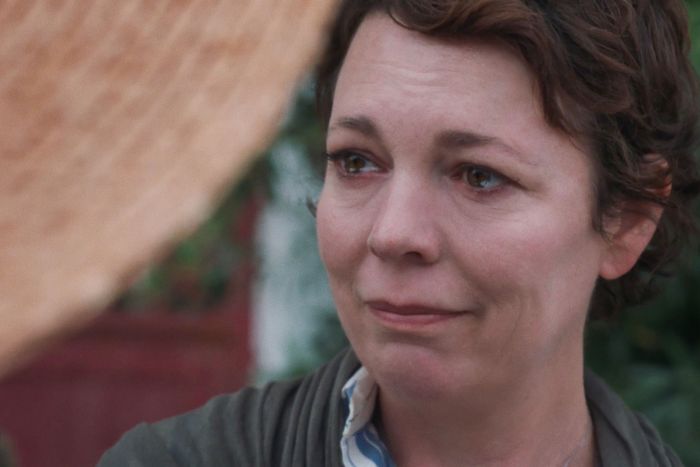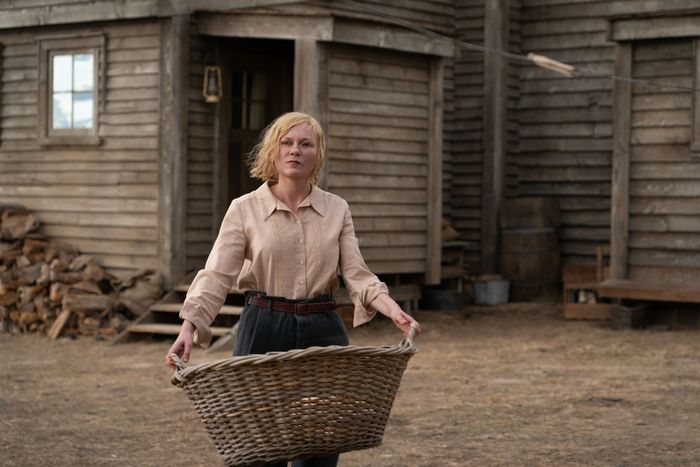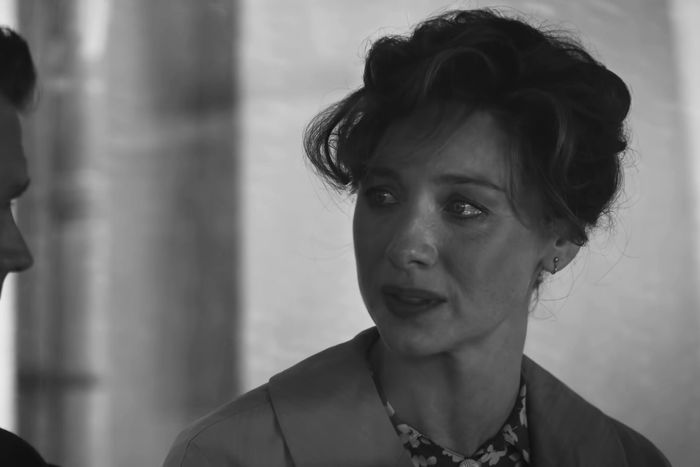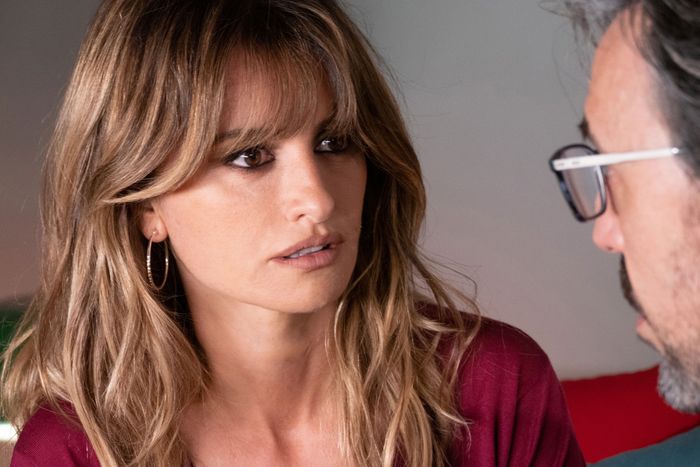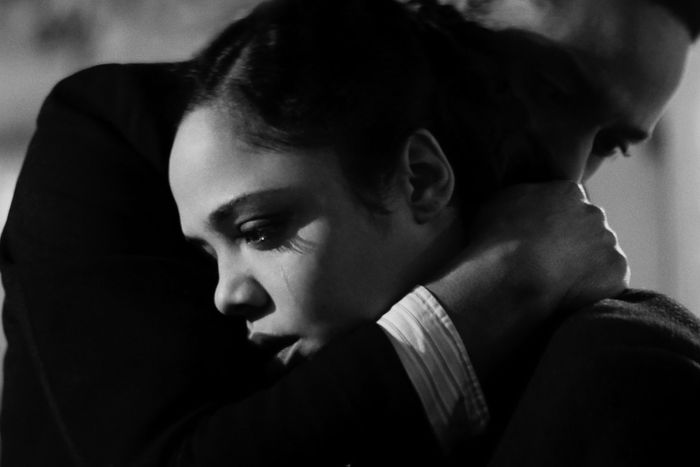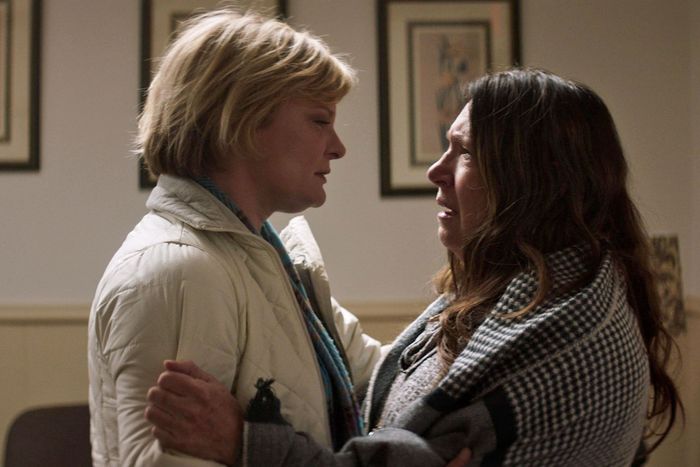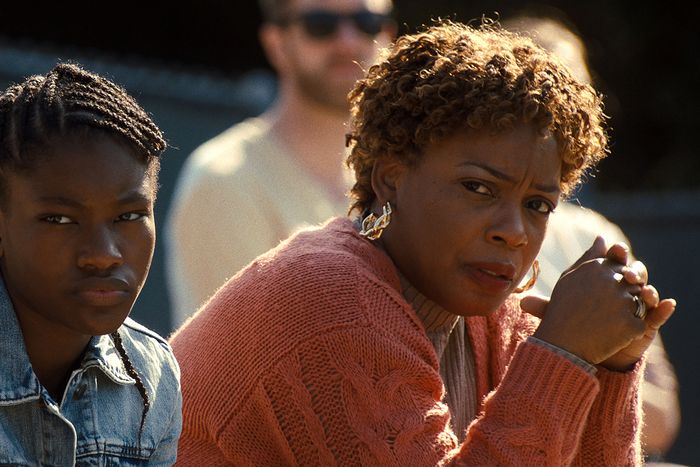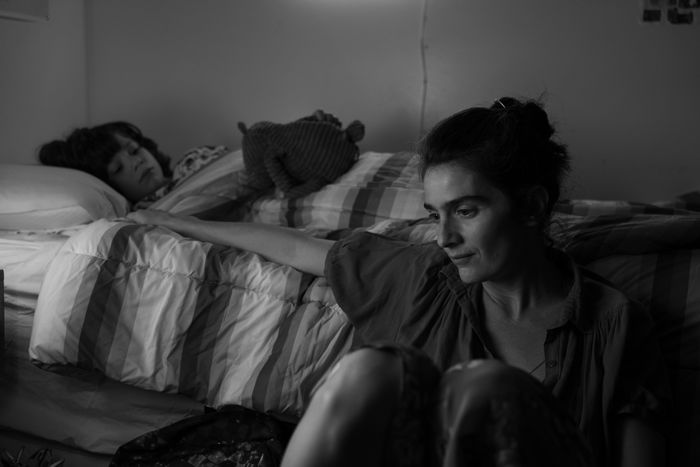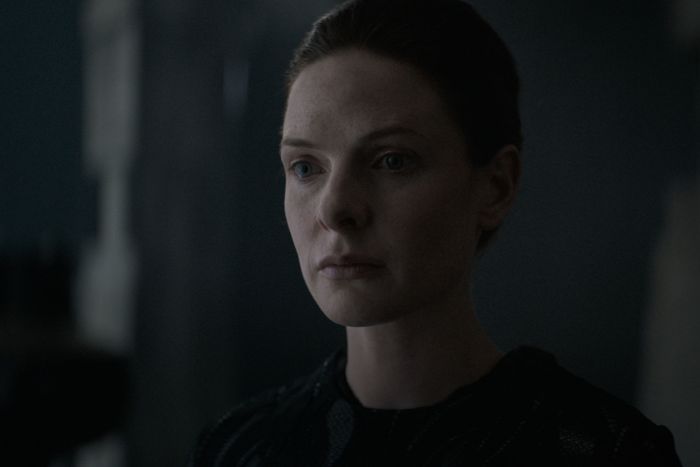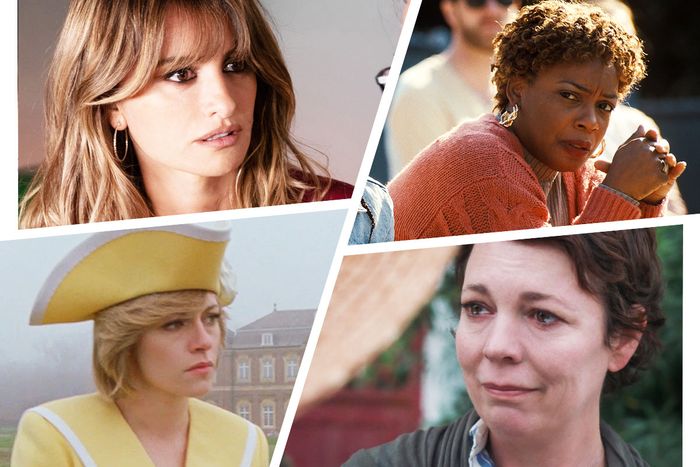
“Children are a crushing responsibility. Happy birthday.”
That’s Olivia Colman in The Lost Daughter, warding off a pushy, pregnant beachgoer who’s interrupting her relaxation. But it could also serve as the motto for this Oscar season, an unofficial film festival about mothers in distress. The sadness first popped up at Telluride, when I saw Spencer and The Lost Daughter in the same afternoon. By the time the rest of the contenders had arrived, it was clear: This was the year of sad moms at the movies. Some of them are sad about being moms, and some are sad about other things, but all are united in giving a few of our greatest actresses the chance to feast on all the complexities of maternal anxiety.
Opinions may vary on which mom is the saddest, though when it comes to whose children are the worst, I think we’ve got some clear winners. But ultimately I’d prefer to celebrate these complicated women as a collective. Here’s your guide to the sad moms of Oscar season.
Kristen Stewart, Spencer
The role: Diana, Princess of Wales, who’s driven to the verge of madness during a terrible Christmas with her in-laws.
What is she sad about? Basically everything. Her marriage is falling apart, she’s the most gossiped-about woman in the world, and now she has to spend three days with her husband’s relatives (who all hate her) and their servants (who are all spying on her). Unable to conform to stultifying Victorian tradition, Diana fully dissociates, fantasizing about self-harm and having paranoid visions of Anne Boleyn. Are the royals planning to have her killed too?
How does she feel about being a mom? In a season full of maternal ambivalence, Spencer’s Diana is the woman with the least complicated feelings towards motherhood. In the dehumanizing circus of royal life, her relationship with her sons is her one source of love and joy. They’re the only two people in the world with whom she can truly be herself. As she tells young Prince William, she has no real desire to be queen: “Being your mum, that’s my job.” For Diana, motherhood is a pure, good thing. She’s the saddest mom of the year, but probably the happiest about being a mom.
Olivia Colman in The Lost Daughter
The role: Leda, an academic (she lives in Cambridge, near Boston) whose trip to a Greek island spurs memories of her time as a frustrated young mother.
What is she sad about? Disproving the ancient wisdom of Kanye West, Leda at first glance seems filled with the quotidien frustrations of the unhappy vacationer: All the other people on the beach are ruining her vibe! But as the film goes on, her ennui reveals itself as something more elusive and existential. On the beach, Leda encounters Nina (Dakota Johnson), a tot mom who recalls her younger self (played by Jessie Buckley in flashbacks), and whom she alternately consoles and torments. The movie resists easy explanations, but Leda’s lingering unease over motherhood seems to play a role.
How does she feel about being a mom? Funny you should ask: She hates it. In fact, The Lost Daughter gives us three sad moms for the price of one. There’s adult Leda, who has a fraught relationship with her grown daughters; Nina, who chafes at her maternal responsibilities and is treated as an afterthought by her husband’s mobbed-up family; and young Leda, the saddest mom of all, who finds motherhood so soul-sucking that — spoiler alert — she ultimately abandons her family for the sexy world of comparative literature. (Her husband is played by Jack Farthing, the season’s go-to actor for unfulfilling spouses: He also plays Prince Charles in Spencer.) The Lost Daughter depicts motherhood as so unpleasant, every child a grubby little hell-beast, that after watching it I was half-tempted to call up my own mom and ask, “We weren’t that bad, were we?”
Kirsten Dunst, The Power of the Dog
The role: Rose, a widow in 1920s Montana who remarries into a wealthy family and comes into conflict with her asshole brother-in-law, Phil (Benedict Cumberbatch).
What is she sad about? Phil, mostly. Cumberbatch plays him as the queen bitch of the West, always lurking in the shadows ready to drop another cutting remark. But Rose’s well-intentioned husband (Jesse Plemons) doesn’t quite understand her, either: He’s unable to see how uncomfortable she is in his world, constantly pressing her into situations she finds humiliating. It’s enough to drive a girl to drink.
How does she feel about being a mom? Like Diana, Rose’s main form of solace comes in the form of her son, Peter (Kodi Smit-McPhee). The two of them spent a long time having only each other, and so Rose accepts Peter’s eccentricities even when they’re off-putting. She looks out for him, and he does the same. “When my father passed, I wanted nothing more than my mother’s happiness,” Peter says in the film’s opening narration. “For what kind of man would I be if I did not help my mother?” The form this help eventually takes makes for one of the most delicious plot developments of the year.
Catríona Balfe, Belfast
The role: Ma, a housewife trying to keep her family afloat during the sectarian turmoil of late-’60s Belfast.
What is she sad about? As the film makes clear, the ’60s were not an especially swinging time in Northern Ireland. Van Morrison’s opening theme has barely stopped playing by the time Ma is forced to deploy her son’s trash-can-lid shield as protection against stones thrown by a loyalist mob. To make matters worse, her husband (Jamie Dornan) is often absent working in England, meaning she has to raise her two boys — and clean up their dad’s messes — almost single-handedly. She’s left with an impossible choice: Stay in a city that’s being torn apart or leave the only world she’s ever known.
How does she feel about being a mom? Much has been made about how attractive Balfe and Dornan are in their roles, but young Buddy (Jude Hill) is pretty cute himself: He’s as blond and cherubic as any sitcom lead. Ma’s reaction to his mischievous scrapes is pitched on this same level, more hands-on-hips exasperation than true despair. Writer-director Kenneth Branagh based Belfast on his own childhood, so you can understand why the movie retains a rosy view of domestic life. Raising children adds to the stress of the Troubles, but they’re not too much trouble themselves.
Penélope Cruz, Parallel Mothers
The role: Janis, a photographer who finds herself unexpectedly pregnant while investigating her ancestor’s murder in the Spanish Civil War and subsequently bonds with an even sadder mom, her teenage maternity-ward roommate, Ana (Milena Smit).
What is she sad about? For one, the government is dragging its heels on her attempts to shed light on the Civil War massacre. And two, after her baby is born, she gets a few heartbreaking surprises that I won’t spoil, but let’s just say they complicate her relationship with the child, and with Ana. Does Janis reveal the truth, or does she find a way to live with the lie? It’s historical trauma and steamy melodrama all at once — a classic Pedro Almódovar mix.
How does she feel about being a mom? She loves it. The movie places Janis in a lineage of proud Spanish mothers — sometimes the baby-daddies are married and won’t leave their wives, other times they’ve been killed by Fascists, but no matter what, the women will handle it themselves. It isn’t too long before Janis is serving as a surrogate mom to Ana, too, though since this is Almdóvar, there is a devilish psychosexual twist to that role as well.
Tessa Thompson, Passing
The role: Irene, a bourgeois Black woman in Jazz Age Harlem shocked to discover that her old school friend Clare (Ruth Negga) is living as a white woman.
What is she sad about? Passing takes place in a depressive fog, so the question is more “What isn’t Irene sad about?” She’s raising two boys in a world that’s fundamentally unsafe for them. Her marriage has settled into a cold functionality. And Clare keeps on wheedling her way into Irene’s world like a cuckoo. She’s brighter, shinier, more dynamic; the more space Clare takes up, the more Irene recedes into the background of her own life.
How does she feel about being a mom? Depression aside, Irene has a reasonable amount of love for her kids, though like everything she loves, they too become a battleground between her and Clare. When even they seem to prefer the other woman, it’s close to the final straw.
Ann Dowd and Martha Plimpton, Mass
The roles: Linda and Gail, two mothers tied together by shared grief.
What are they sad about? The premise of Mass is almost unbearably bleak: Six years after a school shooting, the parents of the perpetrator sit down with the parents of one of the victims. You can imagine why this situation might be a little bit sad.
How do they feel about being moms? It’s complicated. Once the couples have broken through the initial pleasantries, their discussion turns into a debate over parenting: How much are children creations of their upbringing? Gail (Plimpton), the victim’s mom, presses for answers that Linda (Dowd) and her husband, who also lost their son, are unable to give. The weight is too much to shoulder, their defenses too hardened. There’s a breakdown, a breakthrough, and finally, for Linda, a reckoning: Yes, her child was a murderer, and yes, she loved him.
Aunjanue Ellis, King Richard
The role: Oracene “Brandy” Price, matriarch of America’s most famous tennis family.
What is she sad about? Not much on the surface; she’s a stiff-upper-lip kinda gal. But in a blistering monologue that is sure to be Ellis’s Oscar clip, she reads Will Smith’s Richard Williams to filth, detailing all the ways he’s let her down as a husband and partner. (In real life, Price and Williams got divorced in 2002, which is probably why the Williams family was okay having this scene in the movie.)
How does she feel about being a mom? King Richard presents every parent’s dreams: that your children will have it better than you did, and that all the sacrifices you made on their behalf will pay off. So yeah, I think she feels pretty good.
Gaby Hoffmann, C’mon C’mon
The role: Viv, a single mom who leaves her 9-year-old son, Jesse (Woody Norman), in the company of her brother (Joaquin Phoenix) while she deals with her estranged husband’s mental-health crisis.
What is she sad about? Just … life, man. The reasons for Viv’s sadness are more commonplace than other moms’ on this list, but they’re no less real: she’s grieving her mother, who recently passed; she can’t solve her ex-partner’s issues no matter how hard she tries; and she’s got the stress of single parenthood, and of having to be everything for her son. Because Hoffman is a supporting-actress contender, most of this is explained over the phone.
How does she feel about being a mom? Most sad-mom movies eventually come down to children being either terrible monsters or adorable bundles of joy. C’mon C’mon introduces the revolutionary theory that children are both bundles of joy and terrible monsters. Jesse is a good kid, but he’s also deeply strange — his favorite game is to pretend he’s a lonely orphan — and when he acts out, it’s infuriating. C’mon C’mon compares childhood to being an alien visiting Earth for the first time, and at times, its vision of parenthood really does feel that bizarre.
Rebecca Ferguson, Dune
The role: Lady Jessica, concubine of Duke Leto Atreides (Oscar Isaac), mother of Paul Atreides (Timothée Chalamet), and member of the mysterious Bene Gesserit sisterhood.
What is she sad about? Intergalactic politics, especially when they result in the death of her partner and most of her household. Jessica tries to tamp down her emotions — fear is the mind-killer — but even a trained sister of the Bene Gesserit can’t hold back the tears entirely.
How does she feel about being a mom? She’s not a normal mom, she’s a mom who’s participating in a 10,000-year eugenics program to create a messianic figure called the Kwisatz Haderach. Jessica went against the plan by having a son instead of a daughter (she has magic powers, she can do that), and now Paul might in fact be the Kwisatz Haderach. If he passes the Bene Gesserit’s Gom Jabbar test, her risk will have paid off; if he fails, he dies! Being a mom is tough, even for a space witch.
More on Awards Season
- Cheese: An Annotated History of the Oscar Class Photo
- A Timeline of Will and Jada’s ‘Bad Marriage for Life’
- Baz Luhrmann Is the Stanley Kubrick of Confetti



